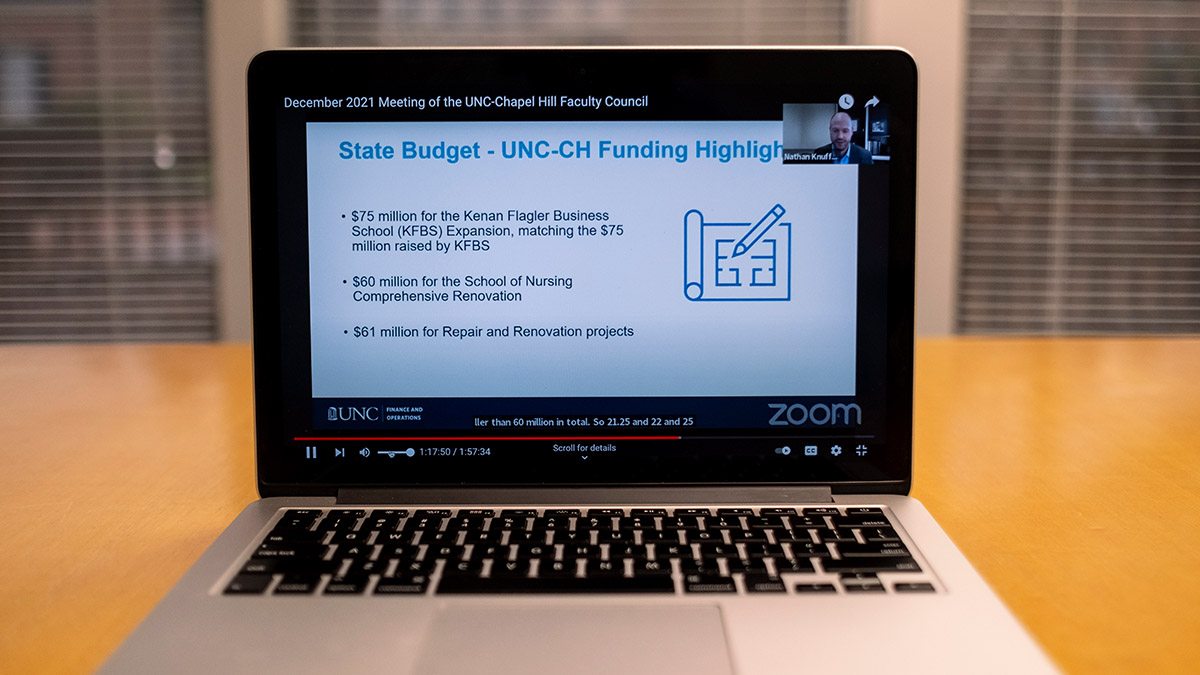Employee bonuses to arrive in December
As part of the new state budget, faculty and staff will soon receive one-time bonuses, with raises coming in 2022. The budget also funds important University initiatives and building repairs.

Carolina employees will receive 2.5% pay raises this year and next, along with a one-time bonus, as part of this year’s state budget, Vice Chancellor for Human Resources and Equal Opportunity and Compliance Becci Menghini said during the Dec. 3 virtual Faculty Council meeting.
Employees will receive one-time $1,000 bonuses and an additional $500 for those making less than $75,000 a year. While the bonuses weren’t expected until early 2022, they are now expected to be paid before the end of December, Menghini said, with raises coming next year, once the University receives further guidance from the UNC System.
Permanent EHRA and SHRA University employees will receive 2.5% across-the-board raises in 2021-22 (retroactive to July 1, 2021) and 2.5% across-the-board raises in 2022-23.
In addition to the raises and bonuses, the budget includes funding for discretionary base-pay adjustments for EHRA and SHRA employees, based on fund availability, not to exceed caps, and to be awarded based on performance, Menghini said.
Raises and bonuses are just one part of the approved budget, which also includes funds for key initiatives and repairs and renovations.

Nate Knuffman, vice chancellor for finance and operations.
“I’m very pleased to be in front of this group discussing an enacted state budget,” said Nate Knuffman, vice chancellor for finance and operations. “I, too, remember vividly discussing the level of revenue uncertainty with you last year at this time, and we are in a much better position today.”
While it took time to reach agreement on a state budget, the result is very strong, Knuffman said.
For Carolina, the General Assembly also approved:
- $18 million for the Rapidly Emerging Antiviral Drug Development Initiative (READDI) program, a collaboration between scientists in the UNC School of Medicine, Eshelman School of Pharmacy and the Gillings School of Global Public Health created to not only combat SARS-CoV-2 but also future viral outbreaks.
- $77 million to the North Carolina Policy Collaboratory, which was established by the General Assembly in 2016 to utilize and disseminate the research expertise across the UNC System for practical use by state and local government.
- Authorizing out-of-state student-athletes to be eligible for in-state tuition, which reduces Carolina’s scholarship expenses and the number of students that counts toward the 18% cap of out-of-state students.
With regards to funding for capital projects, the budget includes:
- $75 million for the Kenan-Flagler Business School expansion, matching the $75 million raised by the business school.
- $60 million for a comprehensive renovation at the School of Nursing, an increase over the requested $45 million.
- $61 million for repair and renovation projects, including $46 million for comprehensive renovation projects, such as HVAC systems for Hamilton and Phillips halls and new HVAC and fire protection needs for Wilson Library. It also includes $15 million for smaller projects, including elevators for Dey and Carroll halls and replacement of air handlers in Davie Hall.
- Knuffman said this is a very strong outcome in the funds for the repair and renovation budget, which over the past decade has received about $4 million a year.
For the UNC System, the state budget funded all the top priorities, Knuffman said. Those include:
- $67 million for enrollment growth for UNC System institutions.
- Building reserves for newly completed facilities at constituent institutions.
- Pay raises for faculty and staff who have not received a pay increase in two years.
- $97 million to fund the Project Kitty Hawk online learning initiative for adult learners.
- $1 billion for repair and renovation funds for existing facilities and new capital projects and $1 billion in additional funds authorized for projects in future years.
Budget planning for fiscal year 2023
State funding is a key variable in the University’s budget, Knuffman said.
Carolina is already working on budget planning for the next fiscal year, with units currently in the process of submitting requests for the fiscal year 2023 budget, because of new approval requirements by the UNC Board of Governors and the University’s Board of Trustees. Carolina will seek approval from the trustees at the March 2022 meeting and from the Board of Governors at the May meeting, he said.
Carolina is in a stronger position than a year ago and has some limited availability for strategic reinvestment into top priorities. The University faces “significant pressures” in two areas: on its workforce to remain competitive with recruitment and retention of employees, and on inflation affecting the cost of research supplies, he said.
Knuffman clarified the role the University’s endowment plays in the finances, saying, “It’s not a savings account.” An endowment is an aggregation of individual gifts that have restrictions. The endowment has “great returns” this year and was up 42%. More than 90% of those funds are restricted, going toward scholarships and fellowships.
Read more about the Dec. 3 Faculty Council meeting and watch a recording of the meeting.




